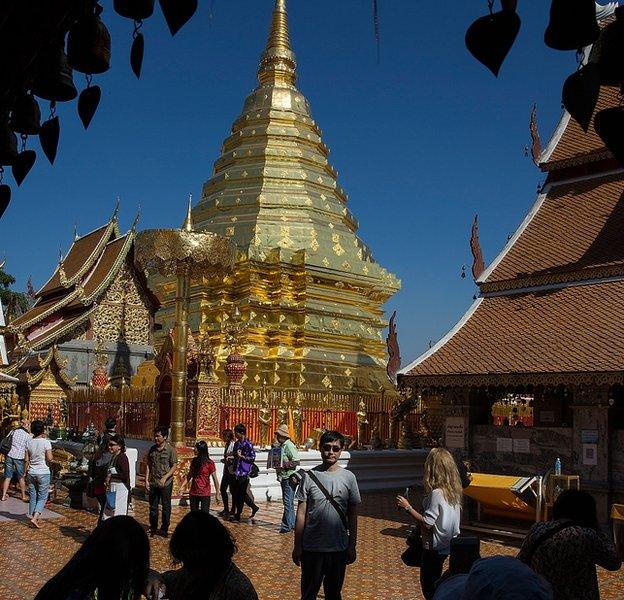Chinese tourists push back against rant about poor manners
- Published

A Thai celebrity's rant against Chinese tourists has been watched over two million times online
An angry - some say prejudiced - rant against Chinese tourists has gone viral in Thailand, leading to a huge discussion on the Chinese internet.
Duangjai Phichitamphon, a model from Thailand, was waiting in line at Jeju International Airport in South Korea when a group of Chinese tourists apparently jumped the queue. Her response was to record a tirade on the spot and post it to Facebook. In the video, she accuses the tourists around her of stepping on her feet and pushing their way to the front of the line - and she also blames them for dirty airport toilets.
The original (which has since been taken down from Phichitamphon's page) is in Thai, but versions of the video with English and Mandarin subtitles uploaded on Facebook, external and YouTube, external have had more than two million hits. On Youku - a YouTube-like site in China - the video, external has drawn more than 3,000 comments. Many of those commenting in Thailand and elsewhere in the world empathised with Phichitamphon, but others warned that her observations were sweeping generalisations. Some even questioned whether the tourists were actually Chinese. One YouTube viewer posted: "Racist, racist, racist. It is disgusting that anyone can make generalisations like this. That this woman can use a small example to judge millions of other people".
On Chinese microblogging site Weibo, external, a serious discussion emerged about how Chinese tourists are perceived abroad. "Our people have done it wrong, I am very sorry and ashamed ... it's inarguable that we should admit our wrong and make it right," wrote Qiusxiaoyu, while user PhumjaiThai posted, "Isn't reflecting and correcting yourself the best way to show your love for the country? So that foreigners will no longer perceive that the Chinese are without manners."
As China's economy has grown and restrictions have been gradually eased, international travel has become more common. More than 5m were expected to travel abroad during the Chinese New Year last month and mainland media reminded tourists to "mind their manners".
Upset over the behaviour of tourists in Thailand is nothing new, says Sucheera Maguire from BBC's Thai service, but this particular incident resonated because of reports of a recent string of incidents at Thai tourist sites. We haven't independently verified any of these incidents but they've certainly been talking points in Thailand. Earlier this week, a Chinese tourist was fined for, external apparently washing her feet in the sink of a public restroom in a national park. Last month, a Chinese passenger allegedly drying her underwear, external at Bangkok's main airport was told to stow them away by tourism authorities. Another case went viral last year, Maguire says, when a Chinese tourist was accused of using a canal as a toilet in the old city area in Chiang Mai.
Mainland Chinese have been criticised on social media in other parts of the region too. Last year we reported on another incident in Hong Kong last year where a child relieved himself on a crowded shopping street - a more or less everyday occurrence that sharply divided Chinese and Hong Kong social media.
While cultural differences and the large numbers of Chinese tourists drive some of this sentiment, the impact of geopolitics also cannot be ignored, says Ian Rowen, a Fellow at the Taiwan Foundation for Democracy. "Many people in Taiwan and Hong Kong resent mainland China's political influence, and the poor behaviour of some Chinese tourists is a potent reminder of their plight," he tells BBC Trending. "The 'uncivilized' behaviour of some tourists seems out of step with China's rising economic and political clout. This has not gone unnoticed by China's government, which has launched 'spiritual education' campaigns to train tourists to be better 'ambassadors' of the nation."

A traveller poses for a picture at Wat Doi Suthep temple in Chiang Mai, where Chinese tourists have been accused of bad behaviour
Blog by Samiha Nettikkara
Reporting by Vincent Ni and Ashley Chan
Next story from BBC Trending: The politically loaded question that got India talking
Or maybe you'd like to look at: Music videos without the, um, music
You can follow BBC Trending on Twitter @BBCtrending, external, and find us on Facebook, external. All our stories are at bbc.com/trending.